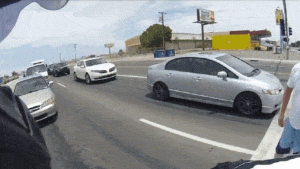Today, everyone has a video camera on them all the time, since most mobile phones come with that functionality. This has made it possible for people to make recordings to document damage or other circumstances after all types of accidents. These recordings can be used as evidence to prove your claim, as long as they are taken legally.
The legality of recording people is tricky, however, and varies from state to state. For example, there are probably no issues if you are simply recording video of your vehicle, the road, debris that either caused or was the result of your accident, etc.
If, however, you are using your video camera to create audio recordings other people without their knowledge, there are many factors that determine the legality of that action. When you share recordings with others, it becomes even more complex.
Recording Video in a Public Place
Most video recordings are legal with or without consent, IF they are done in a place and circumstance where there is no expectation of privacy.
For example, a reasonable person would expect privacy in a bathroom, locker room, changing room, hotel room or guest bedroom. Most states have laws prohibiting video recordings without consent in such areas.
Recording video in a place that any member of the public can access is legal, because there is no reasonable expectation of privacy.
For instance, many motorcycle riders and bicyclists wear helmet-mounted action cameras to capture video of their rides. These recordings have been very useful in proving fault and liability in personal injury cases.
Here are a few examples:

If you’re injured in a motorcycle accident, your case is going to depend on determining liability. Statements like “He pulled out in front of me” are subjective. If you’re able to show a video of a car violating your right of way, you have an excellent chance of being well-compensated for your injuries.

Sometimes, even the mere sight of a video camera can deter incidents of road rage. When it doesn’t, you still have a recording of the assault so you can have your day in court.

When arguing an injury case, there can often be some value to the shock factor. When you can show actual footage of your horrific crash, it proves the reality of your catastrophic injuries.
Audio Recording Laws
Recording audio, or sound, is very different from recording video, because there are specific federal and state laws regarding eavesdropping, wiretapping, and monitoring other people’s conversations, electronically and in person. Failure to abide by these laws can have severe consequences.
You may not record an audio conversation (that is, the sound of people talking) between two other people unless you have their permission. In all states, at least one of the people in any conversation must consent to be recorded for an audio recording to be legal.
For example, if your vehicle has just been hit by another car. In the aftermath of the accident, you record the other driver standing in the street, speaking quietly on the phone with someone else. Unless you have that person’s consent, you cannot record audio of their conversation no matter where you are, because you are not involved in it.
The two situations typically defined for audio recording are “One Party Consent” and “Two Party Consent,” (or “All Party Consent”).
One Party Consent
One party consent law requires the consent of one party involved in the conversation (for example, the person doing the recording) to consent to recording the conversation. If you are part of the conversation, that means you do not have to notify any other parties they are being recorded.
One-party consent states include:
- Arizona
- District of Columbia
- Georgia
- Maine
- New York
- Texas
In those states, you may record video and audio of another person shouting at you, because you are the other person involved in that “conversation,” and you can give consent to recording it.
All-Party or Two-Party Consent
All-party consent states include:
- California
- Illinois
- Nevada
- Washington
Two-party or all-party consent laws require the consent of all parties in the conversation to be recorded. You must have their consent even if they are in public and have no reasonable expectation of privacy.
In all states, however, you can legally record the video of the person’s actions, if you cannot hear the audio portion. If the person moves aggressively toward you with a raised fist, the video alone will prove assault.
Recording on Private Property
Let’s say a companion had a slip and fall in a store, and you turn on your video camera to record the manager’s response to the incident.
It is important to understand that people can set rules in their own buildings – even in government buildings. If they tell you that you are not allowed to record there, they have that right. If you keep recording, they can demand that you leave, and charge you with trespass if you don’t.
Sharing Video
It is also important to understand that recording a video is different than sharing a video.
If you legally recorded a video of someone in public for the purpose of documenting your accident, you are free to share that video with your attorney, your insurance adjuster, or anyone else who has a valid reason to see it. As the person who recorded the video, you own copyright on it.
What if you post the video on social media, and the other person in the video demands you take it down?
Again, if it was legal to record the video – in other words, the person had no expectation of privacy, and you are not violating any audio recording laws in the state where you recorded – you aren’t violating any laws by posting it.
If you try to make money with the video, then you are violating the other person’s right of publicity, or the right to control who makes money from their image.
So, Is it Legal?
To answer the title question, yes, it is legal to have a video camera on your vehicle, or even your helmet, as long as you don’t alter the helmet structure – for instance, by drilling holes in it. You can strap a camera to your helmet or mount it to your vehicle.
It is legal to record video when you are in public, and there is no reasonable expectation of privacy.
It is legal to record audio of conversations you are involved with in one-party consent states.
It is legal to share legally-obtained recordings; however, it is NOT legal to make a profit from a recording of another person without their permission.
In terms of protecting your interests after an accident, video footage can be very useful to prove liability for negligence or assault. Take care with audio recordings, and when in doubt, only share the recording with people who have a legitimate need to see it – such as a personal injury attorney.
If you have been injured in an accident, whether or not you have video, the attorneys at TorkLaw can assist you in obtaining the compensation you need and deserve.





